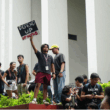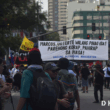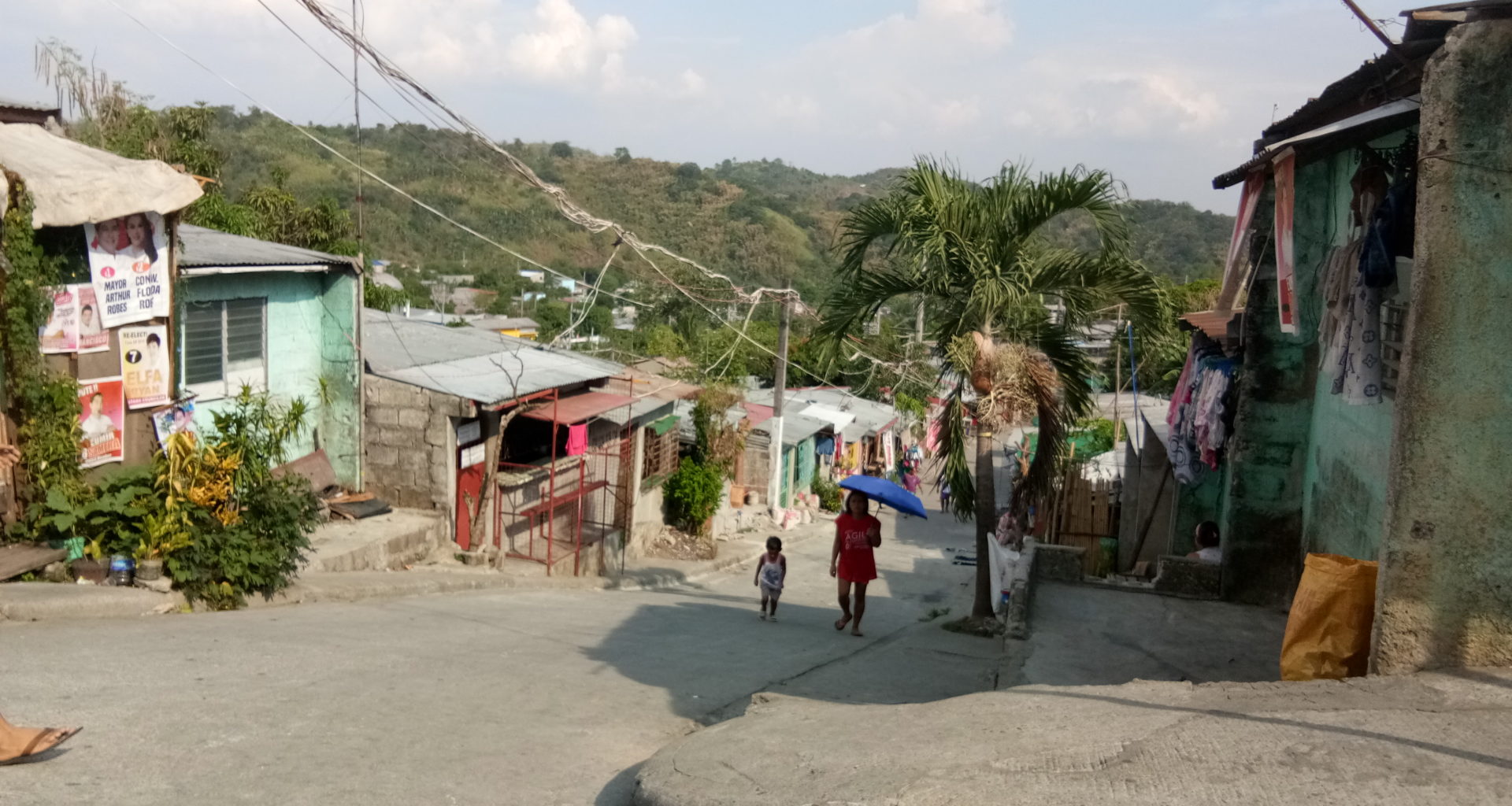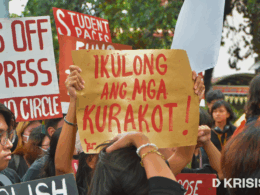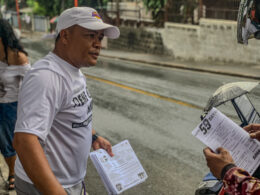A strung-together bamboo fence and a gate of scrap wood and screen hold together a house in a relocation site in San Jose Del Monte.
Inside the small bungalow lives a family of five, barely getting by the expensive cost of living in a highly urbanizing community in Bulacan.
“Ito ang bahay namin. Ganyan lang pero pwede na,” says Amparo Escovilla, 33, a volunteer health worker from a non-government organization (NGO) in Towerville, San Jose Del Monte Bulacan.
(This is our house. It’s all we have, but it’s good enough.)
Originally from Cainta, Rizal, the Escovilla family moved to Towerville, Bulacan in 2017 and occupied the small housing unit. It’s supposedly owned by a relocatee who opted to have the unit awarded by the National Housing Authority be rented instead.
“Kasi ang may may-ari talaga dito, ayaw na rin nilang tirahan kasi nga yung anak nila estudyante doon sa Maynila, andoon yung kabuhayan nila,” Escovilla said.
(The person who owns this unit, they don’t want to live here because their child studies in Manila and they make their living there.)
The Towerville relocation site, situated around 40 kilometers away from Metro Manila, was built to re-home families from urban poor areas who were victims of typhoons, earthquakes and flooding, or were affected by government development projects.
But Ate Ampy, as most of the community members call her, is neither a victim of natural disaster nor affected by the railway projects. Her family transferred to Towerville in the quest for affordable housing that would fit their family’s income.
According to her, their previous house in Cainta, rented at P2,500 per month, was smaller than the one they are renting now. Today, their rental fee costs them half as much for a house with a relatively larger space.
“Siya [husband] lang ang nagt-trabaho so tagilid, sobrang tagilid,” said Escovilla, whose husband is a construction worker.
“Tapos nung napunta kami dito is P1,300 nga kahit papano nakaka ahon ahon tsaka nag-volunteer [work] ako diyan,” Escovilla added.
(My husband is the only one who works, so it’s barely enough. And when we went here, the rental fee was just P1,300, so we managed to get by, also I did volunteer work.)
Her husband is a construction worker who earns roughly P1,500 a week, just enough to support their family of five. Aside from the low income, he does not receive the benefits he should be getting as a regular employee because the company is operating without a license.
“Colorum ang kanyang pinapasukan, kumbaga dapat sa tagal niya sa trabaho, yung holiday may bayad na dapat yon,” she said. “Tapos pag mag-absent ka o mag-leave ka, walang bayad yon,” she said.
(He entered into a company that operates without a license, so with how long he’s worked there, he should be getting paid on holidays. And when he’s absent or takes a leave, he doesn’t get paid.)
Ate Ampy volunteers as a health worker in the health sector of CAMP Asia, a Korean NGO in Towerville. She attends various seminars, including trainings for vital signs monitoring. She receives a monthly allowance of P3,000, which they use to pay for the electricity and water bills.
“Kahit papano, nakakatulong. Kahit pambayad na lang sa tubig, kuryente. Pero talagang hindi pa rin, kung tutuusin, hindi talaga siya sapat. Pero okay lang, alangan namang pilitin mo. I-adjust mo din, ikaw na mismo mag-adjust. Hindi naman pera ang mag-aadjust sayo,” Ate Ampy said.
(Somehow, it helps. Even if it’s just money for water or electricity. But if we’re being honest, it isn’t enough. But it’s okay, I’d rather not force it. You adjust. Money won’t adjust to you.)
The situation of the Escovilla family is nothing but a mere manifestation of how insufficient income, lack of job security, and lack of access to affordable housing are interconnected issues that leave poor families below the poverty line.
According to data released by the Philippine Statistics Authority (PSA), 16.1 percent of Filipino families had income below the poverty line on the first semester of 2018, a decrease from 22.2 percent in 2015.
During the same time period, PSA determined the food threshold to be at P7,337, which meant that the amount was the minimum needed for a family of five to meet their basic food and non-food needs for a month.
Currently, the poverty threshold sits at P10,481. The combined income of both Ate Ampy and her husband, which is around P9,000 a month, is not enough to meet the minimum for the poverty threshold.
While the poverty incidence among Filipinos has been decreasing, from 1 in 4 Filipinos in 2006 to 1 in 5 Filipinos in 2015, there are still those such as Ate Ampy whose monthly income are hardly enough to support day-to-day living.
Despite the limited source of income of the Escovilla family, Ate Ampy still finds fulfillness in doing volunteer work in the community and helping other people who are in need. And even though she is not receiving that much income from it, she continues to offer her help during her free time.
“Pagpasok ko diyan [NGO], ang dami kong natutunan. Hindi ano, eto lang ako apat na sulok ng bahay. Yun ang pinakareward sa akin ng pagvo-volunteer, kung sinu-sinong tao ang nakakausap ko,” she said.
(When I started working for them, I learned a lot. It isn’t about the houses. What I like most about my volunteer work are the people I get to meet.)
As of now, the Escovilla family is threatened, again, with an impending relocation. They were told the unit they are occupying will be reclaimed by the owner next year.
The owner, residing in an area near a railway in Tondo, Manila, will be forced to evacuate to Towerville due to a planned road-widening project.
“[Just recently] Dumating dito yung may-ari, parang one year na lang kami. Kasi titirhan na nila,” Ate Ampy said.
(The owner visited, and it’s like we have only one year left here, because they’ll start living here again.)
Though the poverty incidence has been improving over the years, much is left to be desired by Filipinos such as Ate Ampy whose income is insufficient for daily sustenance and housing expenses.
With the midterm elections coming up, it is in the hands of the Filipinos to elect lawmakers who will advocate for genuine change and assert the basic rights and welfare of Filipino families.
This article first appeared in KRISIS (Issue 2, AY 2018-2019) on May 13, 2019.



